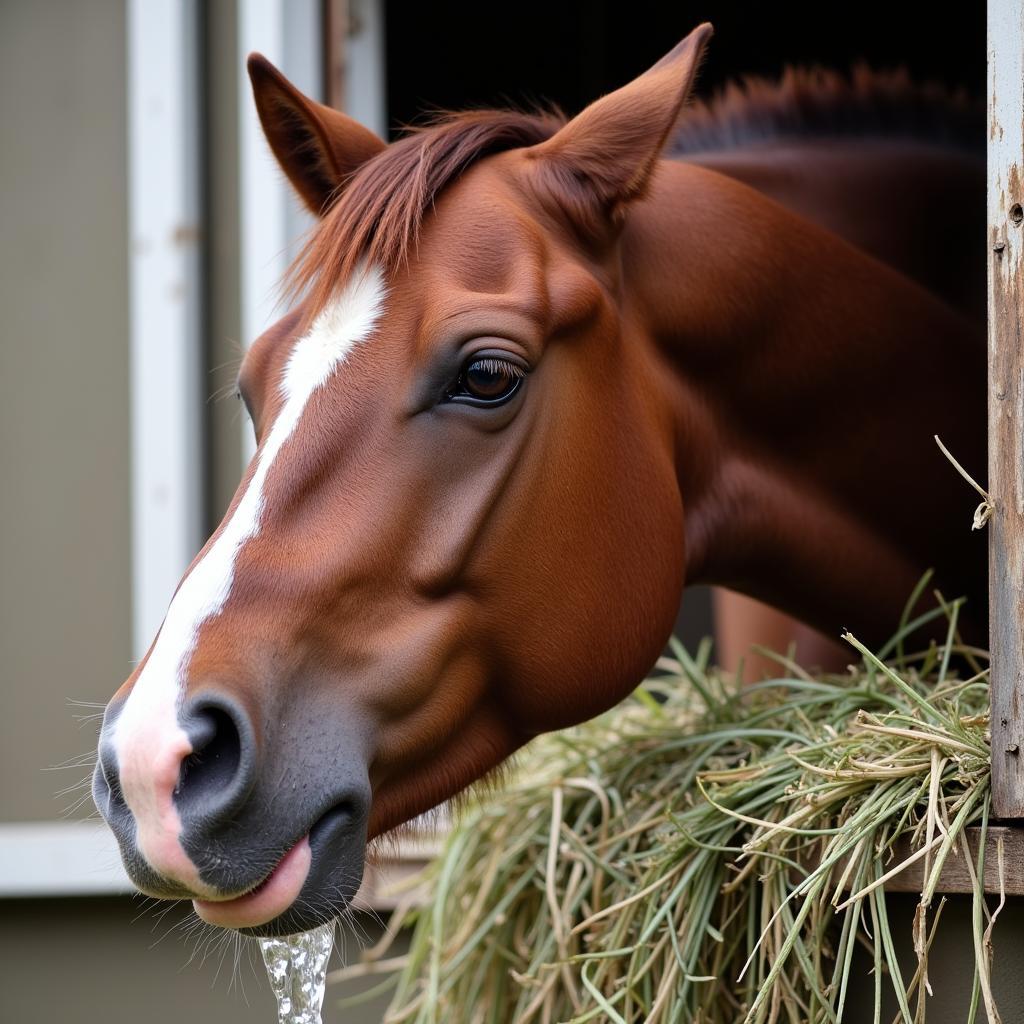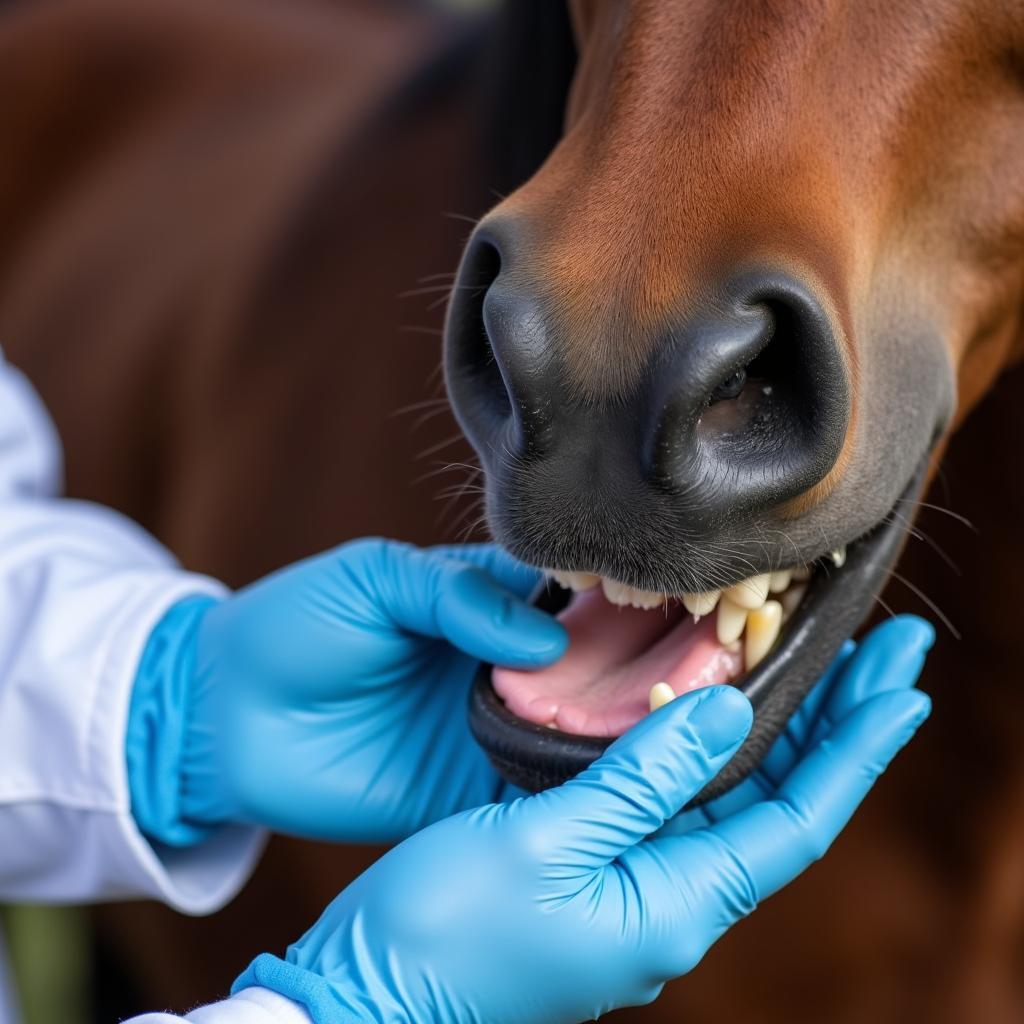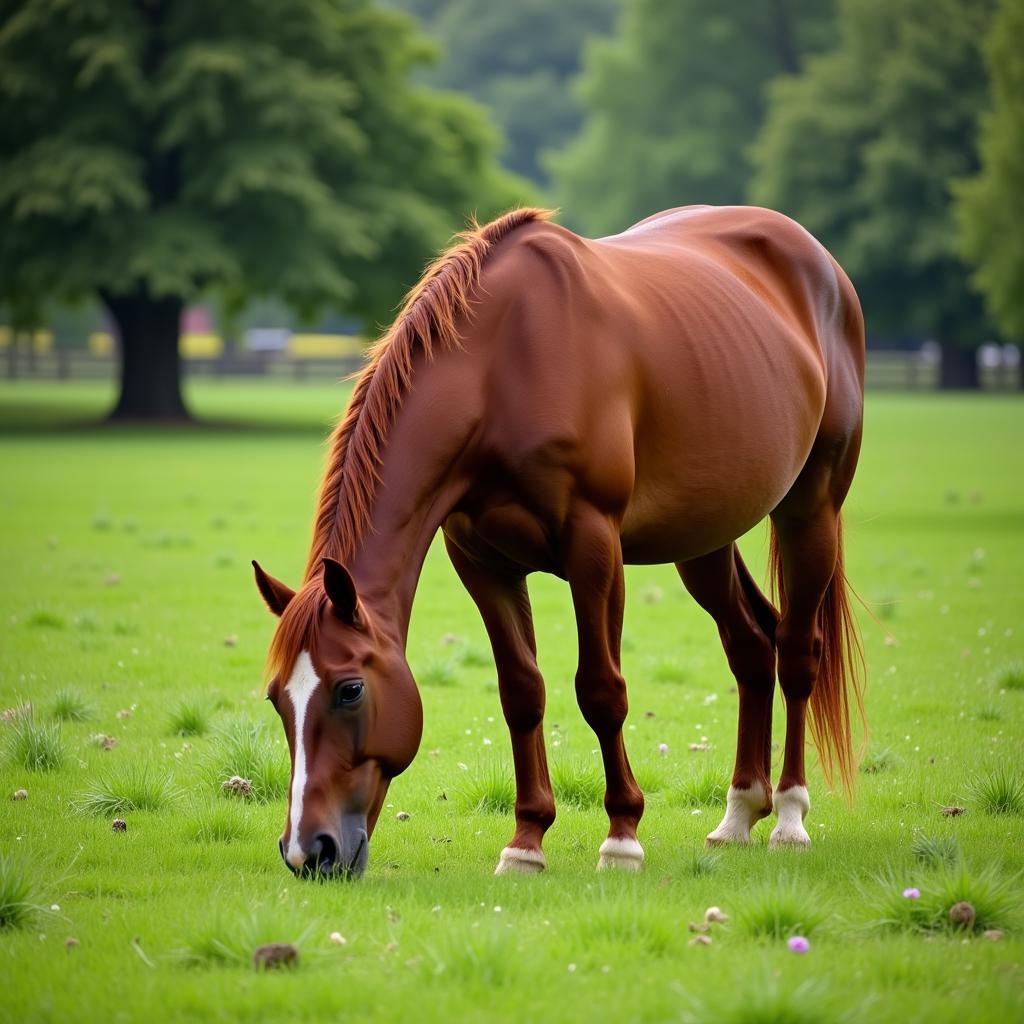Horse Foaming at the mouth might seem alarming, but it’s often a completely normal physiological response. Just like humans salivate, horses produce foam when saliva mixes with air. However, excessive or unusual foaming can sometimes signal an underlying issue.
This comprehensive guide delves into the common causes of horse foaming, helping you differentiate between harmless occurrences and potential health concerns. We’ll explore the factors that contribute to normal foaming, discuss when to seek veterinary attention, and provide valuable insights into keeping your equine companion healthy.
Why Do Horses Foam at the Mouth?
Horses naturally produce saliva, which plays a vital role in their digestive system. Saliva helps lubricate food, making it easier to swallow and digest. When horses chew, especially on hay or grass, they generate more saliva. This increased saliva production, combined with the air mixed in during chewing, results in foam around the mouth.
Let’s take a closer look at specific situations where foaming is considered normal:
- Eating: As mentioned earlier, horses produce more saliva when eating, particularly fibrous foods like hay and grass. The chewing action creates air bubbles that mix with saliva, leading to foaming.
- Exercise: During exercise, a horse’s breathing and heart rate increase. This heightened activity also stimulates saliva production. You might notice foaming around your horse’s mouth during or after a workout, especially if they use a bit.
- Excitement or Stress: Just like some horses grind their teeth when stressed, others might salivate more. This can lead to foaming, particularly if the horse is also agitated and breathing heavily.
 Horse Eating Hay and Foaming
Horse Eating Hay and Foaming
When is Horse Foaming a Cause for Concern?
While foaming is often benign, there are instances where it could indicate a problem requiring veterinary attention. Here are some red flags to watch out for:
- Excessive Foaming: If your horse is producing an unusual amount of foam, significantly more than usual, it’s essential to consult your veterinarian.
- Foaming at Rest: Foaming that occurs when the horse is not eating, exercising, or visibly stressed could be a sign of an underlying medical condition.
- Changes in Behavior: Pay close attention to any changes in your horse’s demeanor alongside the foaming. If they seem lethargic, off their feed, or exhibit other unusual symptoms, contact your vet promptly.
- Oral Irritations: Check your horse’s mouth for any signs of injury, sores, or foreign objects. These can cause discomfort and lead to increased salivation and foaming.
- Dental Problems: Dental issues, such as sharp points on teeth or abscesses, can make chewing painful and lead to excessive salivation. Regular dental checkups with an equine dentist are crucial.
 Veterinarian Examining a Horse's Mouth
Veterinarian Examining a Horse's Mouth
Potential Causes of Abnormal Horse Foaming
When horse foaming falls outside the realm of normal physiological responses, several potential causes warrant investigation:
1. Poisoning
Ingestion of toxic plants or substances can lead to various symptoms, including excessive salivation and foaming. Some poisonous plants that cause foaming include:
- Red Maple
- Black Locust
- Water Hemlock
- Oleander
If you suspect your horse has ingested something toxic, contact your veterinarian or the ASPCA Animal Poison Control Center immediately.
2. Choke
Choke occurs when food becomes lodged in a horse’s esophagus. Horses experiencing choke often exhibit excessive salivation, drooling, and attempts to swallow. This condition requires immediate veterinary attention.
3. Oral Lesions or Infections
Sores, ulcers, or infections in the mouth can cause discomfort and lead to increased saliva production. These lesions might result from:
- Viral infections
- Bacterial infections
- Trauma from sharp objects
- Ill-fitting cheek pieces on horses
4. Neurological Conditions
In rare cases, neurological problems can affect a horse’s ability to swallow properly, leading to drooling and foaming. These conditions require specialized veterinary care.
 Horse Grazing in a Field
Horse Grazing in a Field
What to Do if Your Horse is Foaming Excessively
If your horse exhibits excessive or unusual foaming, follow these steps:
- Stay Calm: While it can be concerning, try to remain calm and assess the situation.
- Remove Potential Hazards: If possible, move your horse to a safe area away from any potential toxins or hazards.
- Observe Closely: Pay attention to the amount of foam, your horse’s behavior, and any other symptoms.
- Contact Your Veterinarian: Describe your observations in detail to your veterinarian. They will guide you on the best course of action, which might involve bringing your horse in for an examination.
Preventing Horse Foaming Related to Diet
You can take certain measures to minimize the risk of your horse experiencing excessive foaming related to their diet:
- Provide High-Quality Hay: Choose hay that is clean, free of dust and mold, and appropriate for your horse’s age and activity level.
- Soak or Steam Hay: Soaking or steaming hay can help reduce dust and make it easier to chew, potentially minimizing excessive saliva production.
- Consider No Chew for Horses: If your horse has dental issues, talk to your veterinarian about “no chew” options such as hay pellets or complete feeds that are easier to consume.
Conclusion
While witnessing your horse foaming at the mouth can be alarming, remember that it’s often a harmless physiological response. However, being aware of the potential causes of abnormal foaming and knowing when to seek veterinary attention is crucial for your horse’s well-being. By staying informed and observant, you can help keep your equine companion happy and healthy.
FAQs about Horse Foaming
1. Is horse foaming always a sign of a problem?
No, horse foaming is often a normal response to eating, exercise, or excitement.
2. When should I be concerned about horse foaming?
Consult your veterinarian if the foaming is excessive, occurs at rest, is accompanied by other symptoms, or if you suspect poisoning or a medical condition.
3. Can I prevent my horse from foaming at the mouth?
You can’t entirely prevent foaming as it’s a natural process. However, providing high-quality hay and ensuring your horse’s dental health can help minimize excessive foaming related to diet.
4. What should I do if my horse is choking?
Choke is an emergency. Immediately remove any food or potential obstructions from your horse’s reach and contact your veterinarian without delay.
5. How often should my horse see an equine dentist?
Horses should have their teeth checked by an equine dentist at least once a year, and some horses might require more frequent dental care.
For any concerns regarding your horse’s health or behavior, always consult with a qualified veterinarian.
Need further assistance?
Contact us:
Phone Number: 0772127271
Email: [email protected]
Address: QGM2+WX2, Vị Trung, Vị Thuỷ, Hậu Giang, Việt Nam.
Our dedicated customer support team is available 24/7 to assist you.